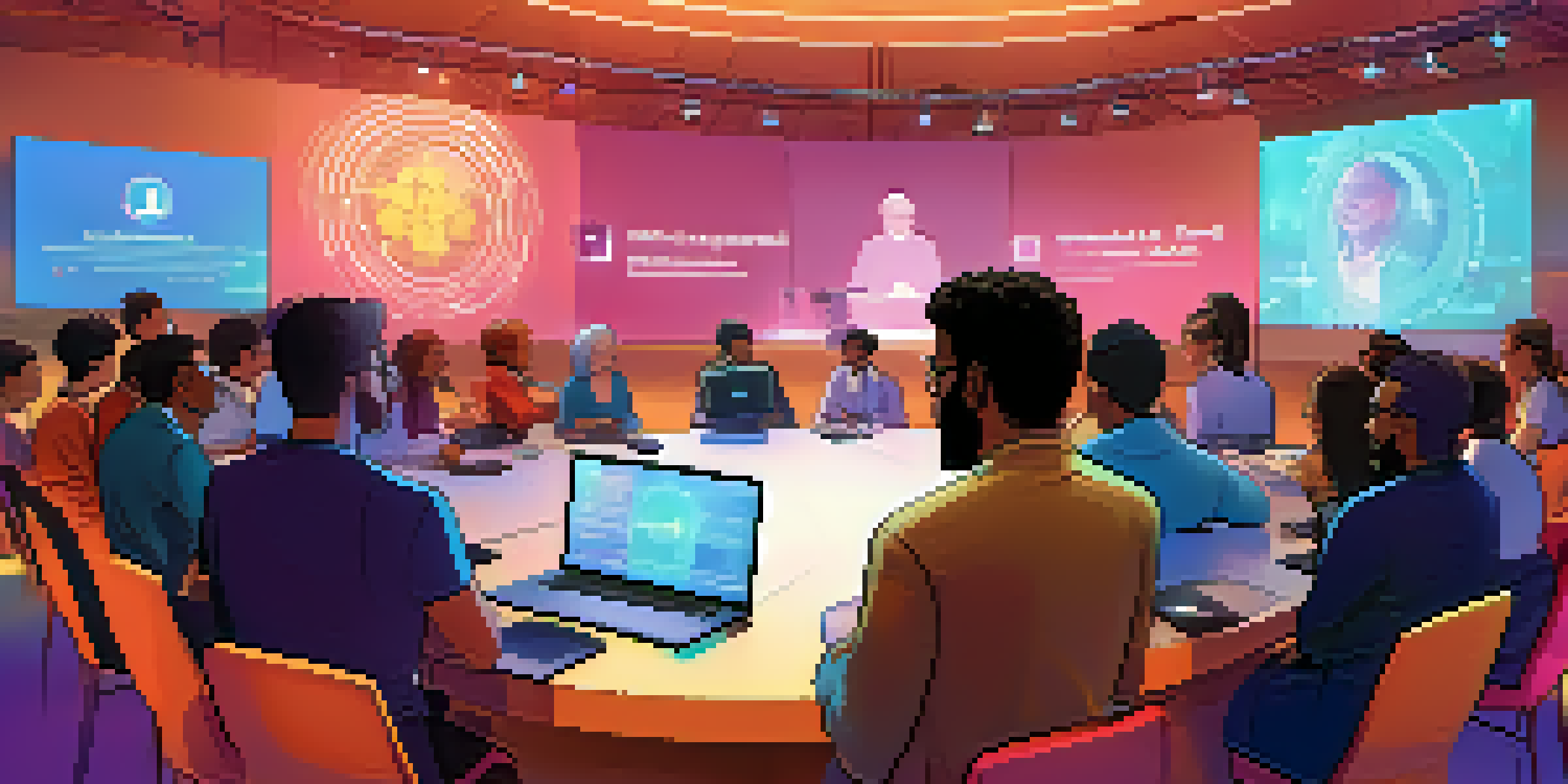Blockchain for Civic Engagement: Opportunities and Challenges

Understanding Blockchain and Its Basics
Blockchain is a digital ledger technology that securely records transactions across multiple computers. This decentralized nature means that no single entity controls the data, making it transparent and tamper-proof. Think of it as a community bulletin board where everyone can see the posted messages, but no one can alter them without consensus.
Blockchain is the first native digital medium for value, and it is a transformational technology that can create new forms of governance.
At its core, blockchain operates through a series of 'blocks' that contain data, which are linked in a chronological chain. Each block is like a page in a book, and once it's filled with information, it gets sealed and cannot be changed. This structure ensures that once something is recorded, it remains a permanent record, which is crucial for trust in civic applications.
As people start to understand blockchain, its potential for civic engagement becomes clearer. It offers a way to empower citizens, enhance transparency in government processes, and even streamline voting systems, making them more secure and accessible.
Opportunities for Enhanced Civic Participation
One of the most exciting opportunities blockchain presents is the potential for increased civic participation. By using blockchain technology, citizens can engage more directly with their local governments, providing feedback and suggestions in a secure environment. Imagine a digital town hall meeting where everyone can voice their opinions without fear of censorship.

Additionally, blockchain can facilitate secure voting systems that ensure every vote counts and is accurately recorded. This could be a game changer in elections, allowing for remote voting while maintaining the integrity of the process. Picture a world where you can confidently cast your vote from home, knowing it’s securely stored and counted.
Blockchain Enhances Civic Engagement
Blockchain technology empowers citizens by enabling secure voting, enhancing transparency, and facilitating direct communication with local governments.
Moreover, blockchain can enhance transparency in government spending and decision-making processes. By making financial transactions visible on a public ledger, citizens can hold their leaders accountable, fostering trust and collaboration between the public and their representatives.
Challenges in Implementing Blockchain Solutions
Despite its potential, implementing blockchain for civic engagement comes with significant challenges. One major hurdle is the technological literacy required for both citizens and government officials. If the technology is too complex, it risks alienating those who could benefit the most from it.
The blockchain does one thing: It replaces third-party trust with mathematical proof that something happened.
Another challenge lies in the regulatory environment. Governments need to establish clear guidelines on how blockchain can be used in civic applications, which can be a slow and bureaucratic process. Just like trying to navigate a maze, the path to regulation can be confusing and frustrating.
Lastly, the issue of data privacy and security cannot be overlooked. While blockchain is inherently secure, the data entered into it may still pose privacy concerns. Striking the right balance between transparency and confidentiality is crucial to ensure that citizens feel safe using these systems.
Real-World Examples of Blockchain in Civic Engagement
Several cities and organizations are already experimenting with blockchain to enhance civic engagement. For instance, in Estonia, blockchain technology is used to secure digital identities, allowing citizens to access government services online safely. It’s like having a virtual key that opens all the doors to public services without compromising your personal information.
Another notable example comes from the city of Zug in Switzerland, often referred to as 'Crypto Valley.' Zug has implemented a blockchain-based voting system for its citizens, allowing them to participate in local governance digitally. This initiative showcases how tech can bridge the gap between citizens and their government in a more modern way.
Challenges to Blockchain Adoption
Technological literacy, regulatory hurdles, and data privacy concerns pose significant challenges to the successful implementation of blockchain in civic contexts.
These examples illustrate not just the feasibility of blockchain in civic engagement but also its potential to revolutionize how citizens interact with their governments. By leveraging technology, we can foster a more inclusive and participatory democratic process.
The Role of Education in Successful Adoption
Education plays a vital role in the successful adoption of blockchain for civic engagement. If citizens and officials are unaware of how blockchain works, they may be hesitant to embrace it. Think of it like teaching someone to ride a bike; without guidance, they may struggle to feel confident enough to take off on their own.
Workshops and community programs can demystify blockchain technology, helping people understand its benefits and applications. By equipping citizens with knowledge, we empower them to advocate for blockchain initiatives within their local governments. It’s about building a community of informed individuals who can contribute to meaningful discussions.
Moreover, educational initiatives can help address concerns about security and privacy, alleviating fears surrounding the technology. When people feel informed and secure, they are more likely to participate actively in civic engagement efforts.
Future Prospects for Blockchain in Civic Engagement
Looking ahead, the prospects for blockchain in civic engagement are promising. As technology continues to evolve, we can expect to see more innovative applications that enhance transparency and participation. It’s like planting a seed today and watching it grow into a strong tree that benefits the whole community tomorrow.
Emerging technologies, such as artificial intelligence and the Internet of Things, could further complement blockchain, creating a more interconnected civic ecosystem. Imagine real-time data sharing that keeps citizens informed and engaged with local issues, fostering a culture of collaboration and accountability.
Education is Key to Success
Educational initiatives are crucial for demystifying blockchain, helping citizens and officials feel confident in utilizing this technology for civic engagement.
Ultimately, the future of civic engagement will likely revolve around technology, and blockchain is at the forefront of this transformation. By harnessing its power, we can create more resilient, transparent, and inclusive systems that empower citizens.
Conclusion: Embracing Blockchain for Civic Engagement
In conclusion, the intersection of blockchain and civic engagement opens up a world of possibilities. While there are challenges to navigate, the potential benefits far outweigh the hurdles. Embracing this technology can lead to a more engaged and informed citizenry, fostering stronger relationships between the public and their leaders.
As we continue to explore the capabilities of blockchain, it’s essential to prioritize education and transparency. By doing so, we create an environment where everyone feels empowered to participate in the democratic process. It’s about building a better future, one block at a time.

Ultimately, the journey toward incorporating blockchain into civic engagement is a collective effort. With collaboration and innovation, we can establish a more participatory and transparent governance model that truly represents the voices of all citizens.